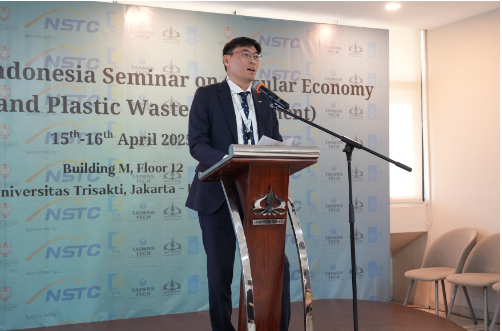Taiwan and Indonesia Strengthen Circular Economy Coorperation through International Seminar in Jakarta
- STIC CEGIR

- May 13
- 3 min read
To enhance collaboration in the field of circular economy, Taiwan-Indonesia Science and Technology Innovation Center (STIC), in partnership with Trisakti University, held the 2nd Taiwan-Indonesia Circular Economy Seminar on April 15-16, 2025, in Jakarta. The seminar focused on two key topics: electronic waste management and plastic waste management, and attracted nearly 100 participants from government, academia, industry, and students from both countries. The event underscored the strong commitment of Taiwan and Indonesia to advancing a sustainable economy.

STIC invited distinguished alumni of Taiwan Tech who now lead green enterprises to share the latest technologies and practices in circular economy. Among them were Kevin Liang (General Manager, TUL IoT – a subsidiary of TUL Group), Robert Su (Independent Commissioner, TUL Group), and Leo Chang (International Marketing Director, UWin), who presented the latest developments in lithium battery recycling and reuse. The two companies have jointly invested USD 60 million to establish a lithium battery recycling facility in the Wiraraja Industrial Zone in Batam, which is scheduled to begin operations in August 2024. The facility is expected to become a key hub for Taiwan’s green industry presence in Indonesia.


In addition to e-Waste, plastic waste management was also a major focus of the seminar. President Cheng of Li-Tsang Plastic Taiwan and Manager Huang of Chieh-An presented Taiwan’s plastic recycling technologies, particularly in PET bottle sorting, washing, and food-grade reprocessing. These technologies integrate automation and digital systems, demonstrating Taiwan’s excellence in efficient and sustainable plastic waste management.

From the Indonesian side, Coca-Cola Indonesia participated through its Director of Sustainability, Lucia Karina, who shared how the company incorporates Sustainable Development Goals (SDGs) and Environmental, Social, and Governance (ESG) principles into its business strategy as part of its commitment to social responsibility and environmental stewardship.

Trisakti University President Prof. Kadarsah Suryadi noted that Indonesia produces over 1.8 million tons of e-Waste and 3.2 million tons of plastic waste annually. As an archipelagic nation with more than 17,000 islands, Indonesia ranks among the countries with the highest levels of microplastic pollution in the ocean. He emphasized that Taiwan has extensive experience in the 4-in-1 recycling syste, robust waste management regulations, and technological innovation. Therefore, the Taiwan-Indonesia partnership offers high complementarity and significant potential for future development.

In his opening remarks, Bruce Chen, Head of the Taipei Economic and Trade Office (TETO) in Indonesia, stated that electronic and plastic waste have become global environmental challenges. He noted that the Indonesian government has shut down more than 300 illegal dumping sites and is actively promoting the construction of waste-to-energy facilities. With its mature waste management technologies and practices, Taiwan is expected to be a key partner in supporting Indonesia’s environmental efforts.

Representative from Taiwan’s Ministry of Environment, Ms. Chien and Ms. Lee (Section Chief) from the Resource Circulation Administration, shared Taiwan’s 40-year experience in circular economy policymaking, digital transformation in waste management, and incentive systems for waste reduction. Their presentations reflected Taiwan’s commitment to shared knowledge and supporting partner countries through practical collaboration and technology transfer.
The seminar was co-hosted by Trisakti University, with support from Taiwan’s National Science and Technology Council (NSTC), TETO in Indonesia, and Taiwan Ministry of Environment, and alumni-led enterprises from Taiwan Tech. Ho Lin, Director of the NSTC Science Office in Australia, emphasized that STIC serves as a cross-sectoral platform connecting academia, government, and industry to drive innovation and impactful technology transfer.

Over the course of the two-day event, participants discussed key issues such as recycling policy, digital transformation, marine pollution control, and international collaboration. They agreed that circular economy must move beyond slogans and be realized through concrete coorperation and technological implementation. Moving forward, Taiwan and Indonesia will continue to deepen collaboration in renewable energy, resource recovery, and sustainable development toward a resilient and innovative green future.




